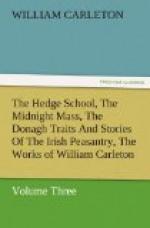* The county jail.—Johnny Short was for many years the Governor of Monaghan jail. It was to him the Mittimus of “Fool Art,” mentioned in Phelim O’Toole’s Courtship, was directed. If the reader will suspend his curiosity, that is, provided he feels any, until he comes to the sketch just mentioned, he will get a more ample account of Johnny Short.
“My curse upon you, Findramore,” exclaimed Mat, in a paroxysm of anguish, “every day you rise! but your breath’s unlucky to a schoolmaster; and it’s no lie what was often said, that no schoolmaster ever thruv in you, but something ill came over him.”
“Don’t curse the town, man alive,” said the constable, “but curse your own ignorance and folly; any way, I wouldn’t stand in your coat for the wealth of the three kingdoms. You’ll undoubtedly swing, unless you turn king’s evidence. It’s about Moore’s business, Mr. Kavanagh.”
“Damn the bit of that I’d do, even if I knew anything about it; but, God be praised for it, I can set them all at defiance—that I’m sure of. Gentlemen, innocence is a jewel.”
“But Barny Brady, that keeps the shebeen house—you know him—is of another opinion. You and some of the Pindramore boys took a sup in Barny’s on a sartin night?”
“Ay, did we, on many a night, and will agin, plase Providence—no harm in takin’ a sup any how—by the same token, that may be you and yer friend here would have a drop of rale stuff, as a thrate from me?”
“I know a thrick worth two of that,” said the man; “I thank ye kindly, Mr. Kavanagh.”
One Tuesday morning, about six weeks after this event, the largest crowd ever remembered in that neighborhood was assembled at Findramore Hill, whereon had been erected a certain wooden machine, yclept—a gallows. A little after the hour of eleven o’clock two carts were descried winding slowly down a slope in the southern side of the town and church, which I have already mentioned, as terminating the view along the level road north of the hill. As soon as they were observed, a low, suppressed ejaculation of horror ran through the crowd, painfully perceptible to the ear—in the expression of ten thousand murmurs all blending into one deep groan—and to the eye, by a simultaneous motion that ran through the crowd like an electric shock. The place of execution was surrounded by a strong detachment of military; and the carts that conveyed the convicts were also strongly guarded.
As the prisoners approached the fatal spot, which was within sight of the place where the outrage had been perpetrated, the shrieks and lamentations of their relations and acquaintances were appalling indeed. Fathers, mothers, sisters, brothers, cousins, and all persons to the most remote degree of kindred and acquaintanceship, were present—all excited by the alternate expression of grief and low-breathed vows of retaliation; not only relations, but all who were connected with




